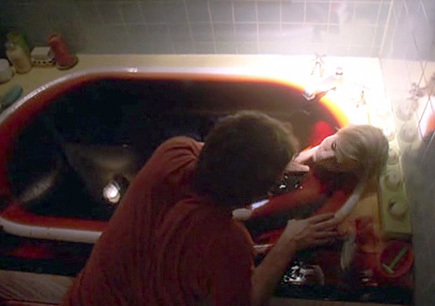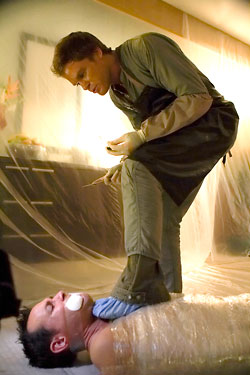

For story purposes, it makes sense that Logan falls victim to Dexter. Dexter tries to handle the situation without bloodshed, but when Logan reaches for his gun, Dexter slips into self-preservation mode and dispatches with the deputy. And take stock of the way that Dexter uses the vigilante angle, not just to manipulate Harrison, but out of his own vanity and self-aggrandizement, despite not actually caring about saving any life other than his own.ĭexter’s biggest sin in “Sins of the Father” is obviously his murder of Logan. Examine the parallels of Dexter and Kurt’s interrogations by Angela and how self-satisfied both men are with their lying, how assured they are that they’ll slip out of trouble again, and how condescending they are to Angela and her past. Notice how Dexter’s eyes linger on a nearby knife as Angela attempts to arrest him, unsubtly suggesting that she would end up just like the other cops that attempted to bring Dexter to justice. While fans can argue that Dexter’s hero façade was dropped too suddenly, in a vacuum, the finale does a great job at positioning Dex as a rabid dog that needs to be put down. He claims he can quit at any time while his shirt and face are covered with an innocent man’s blood. Selfishly, he yearns for Harrison to share his disorder and he doesn’t think twice about uprooting the transient Harrison, who seems happy to finally find a home. Pointedly, Dexter tries hard to manipulate Harrison into seeing him the way that the biggest fans of Dexter see the character, as a badass vigilante who channels his dark urges to save innocents.

After giving into his addiction, Dexter is elated to discover that his son may have the same urges, and in the final episodes he works hard to enable those desires in hopes that his son will continue to enable his own.

In addition to being a story about father and son, Dexter: New Blood is about relapse. While some may say a person’s decision to use drugs is their own choice, addicts’ actions have a ripple effect that can impact the lives of those closest to them and others. Just like the other “anti-heroes” mentioned above, Dexter is selfish and smug, and unlike say the ending of season seven, New Blood showrunner Clyde Phillips does not let him off the hook for it this time.Ĭontrary to what Trinity Killer fans will tell you, season 2 is the best season of Dexter, and the show was never clearer about what the story was: Dexter is an addiction parable. Like Tony Soprano and Walter White, he’s a bad guy, except those shows made their monsters explicitly monstrous, whereas the later seasons of Dexter always treat Dexter as the hero and never ask the audience to question his behavior or motives. He repeatedly broke his own “code” without dwelling on it for more than an episode.

He was directly responsible for the murder of his wife, Rita. He was directly responsible for the murder of Maria LaGuerta. But Dexter is no hero.ĭexter destroyed the life of his sister, Debra. New Blood rightfully asked the audience to reexamine the charming yet sociopathic killer, whom they viewed more like a Batman-esque vigilante than a murder junkie who would stop at nothing to get his next fix. The only reason to bring Dexter back was to hold him accountable for his behavior.
DEXTER RITA DEATH SERIAL
Once fans get over the shock that it’s a wrap for ol’ darkly dreaming Dexter, they’ll realize the serial killer’s fate in Dexter: New Blood was the only ending for the character. This article contains spoilers for the Dexter: New Blood finale.Ī polarizing Dexter finale is better than a universally derided one, right? Dexter: New Blood, the revival of Showtime’s hit drama, finished its run last night with a definitive ending that is leagues above the original swan song, but still controversial among the Dexterfaithful.


 0 kommentar(er)
0 kommentar(er)
